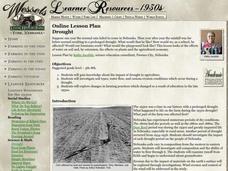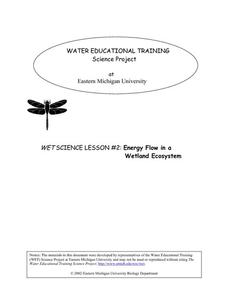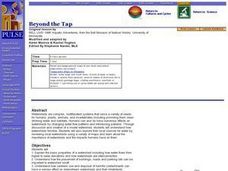Curated OER
Water Quality
Students are presented with a hypothetical situation to investigate the water quality of the James River. They are given data to analyze and put into the graphic organizer that is included to help solve the problem. The lesson includes...
Forest Foundation
Forest Watersheds
Where does the water we use come from? To understand the concept of a watershed, class members study the water cycle and then engage in an activity that simulates a watershed.
Curated OER
Drought
Students gain knowledge about the impact of drought in agriculture. They investigate soil types, water flow, and various erosion conditions which occur during a drought and see how farming practices changed after the 1930's.
Curated OER
Saving the Bay
Students investigate water pollution prevention. In this ecology wastewater lesson, students activate prior knowledge about sewage, then view a video explaining the waste water sewage system used in the San Francisco Bay area. Students...
Curated OER
Runoff: Intro to Watersheds
Students are taught that a watershed is, what types of basic land cover are impermeable and permeable to water. They trace the flow of water around their school and around their home. Students determine what watershed their school is a...
Eastern Michigan University
Energy Flow in a Wetland Ecosystem
How is energy transferred within an ecosystem? What would happen to a food web if one of the organisms was removed? Elementary or middle school ecologists examine these questions and more in a comprehensive 5E learning cycle lesson....
Curated OER
Support and Transport in Plants
All types of transport systems in a dicotyledon plant are detailed here, with clear labelled diagrams and notes for the specific structures and functions. The way that these systems have adapted, and how support is assisted by the...
Foundation for Water & Energy Education
How Can Work Be Done with Water Power? Activity C
Third in a set of lessons regarding reservoirs, dams, and hydropower, this involves a two-day hydropower plant simulation. Collaborative groups build, maintain, and finance the plant. The transparency of the reservoir setup can be...
Curated OER
Aquatic Science and IPC
Students explain the importance of water in our daily lives. In this aquatic science instructional activity, students identify different ways to purify water and make it potable. They design and construct a water filter based on...
Curated OER
BIOASSESSMENT OF STREAMS
Students work as a team to gather organisms from a stream to evaluate if the water quality is excellent, good, or fair to poor.
Curated OER
Wetland/Estuary Structure and Functions
Students plant wetland plants in aquatic soil and regular soil. They test the effect fertilizers have on each and record the chemicals found in run-off water collected from each soil sample.
Curated OER
Science: Dissolved Oxygen and Water Quality Sampling
Students perform tests to determine the level of oxygen dissolved in water. After examining a table displaying the temperature and solubility of water, they examine the three stages involved in the test. Upon completion, students explain...
Desert Discoveries
The Sonoran Desert
Elementary schoolers study the geographic location of the Sonoran Desert. They pay close attention to the characteristics of the plants and animals found in this desert environment. The student handouts embedded in this plan are...
Curated OER
New Jersey Estuaries Water Filter Activity
Students examine how an estuary's plants and soil filter water before it flows into the ocean. They complete a lab report drawing and writing about what they observe after completing a water filter activity.
Curated OER
Mini-Ponds
For this mini pond worksheet, students create a mini-pond ecosystem with soil, water, and plant life. Students let their ecosystem sit for a day and they observe a sample the next day. Students identify all the pond water microorganisms...
Curated OER
Habitat Basics
First graders get out and explore two different habitats to examine how each one meets the needs of the plants and animals that dwell there. They discuss what they've learned about animal habitats as they explore the outdoor environment....
Curated OER
Crowley's Ridge: An Upland in the Lowlands
Young geographers examine how Crowley's Ridge was formed. This is one Arkansa's six natural geologic divisions. The history of Crowley's Ridge is important in that the first settlers of the state were attracted to this region, and it...
Curated OER
Beyond the Tap
High schoolers explain the basic properties of a watershed including how water flows from higher to lower elevations and how watersheds are interconnected. They comprehend how the placement of buildings, roads, and parking lots can be...
Curated OER
Floods: Rising Waters and You
Students will examine how floods work and why they can cause so much damage and destruction. They use a stream table to observe the processes that lead to flooding and the effects of floods on human-made structures. Includes a guide to...
Curated OER
Immersion Presents Monterey Bay
Students study Monterey Bay. In this Monterey Bay instructional activity, students create a model of upwelling around Monterey Bay. Students simulate surface water movement relative to prevailing winds.
DiscoverE
Working with Watermills
Water is a powerful force; harness it through watermills. The task at hand is to create a simple watermill that functions in flowing water for at least three minutes. Scholars work together in teams to design and construct such a...
University of Colorado
Can Photosynthesis Occur at Saturn?
In the 19th activity of 22, learners determine if distance from a light source affects photosynthesis. Participants capture oxygen in straws and find that the amount of water the gas displaces is proportional to the rate of photosynthesis.
Curated OER
Bursting Blooms- Create an Early Spring
Young scholars prune a tree. In this gardening lesson, students select a shrub or tree that has a lot of flower buds and use sharp pruners to cut sections of branches. Young scholars place the cuttings into cool water and...
Outdoor Learning Center
Outdoor Survival
Which of the following can you survive without for the longest time: water, food, or a positive mental attitude? The answer may surprise you. Guide learners of all ages through games, activities, and discussions about surviving in the...























